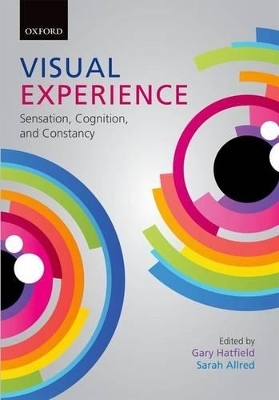
Visual Experience
Oxford University Press (Verlag)
978-0-19-959727-7 (ISBN)
'Seeing' happens effortlessly and yet is endlessly complex. One of the most fascinating aspects of visual perception is its stability and constancy. As we shift our gaze or move about the world, the light projected onto the retinas is constantly changing. Yet the surrounding objects appear stable in their properties.
Psychologists have long been interested in constancies, exploring questions such as: How good is constancy? Is constancy a fact about how things look, or is it a product of our beliefs and judgments about how things look? How can the contents of visual experience be studied experimentally? However, philosophers have long been interested in characterizing visual experience and have become widely interested in the constancies more recently. As psychologists and philosophers have interacted, new questions have arisen: should we regard any departure from constancy as a failure of the visual system, or might it be a reasonable or adaptive response? In what circumstances is 'seeing' highly conditioned by cognitive factors such as background assumptions, and in what circumstances not?
Visual Experience explores size constancy and color constancy. It considers methodologies for studying conscious visual perception, efforts to describe visual experience in relation to constancy, what it means that constancy is not always perfect, and the conceptual resources needed for explaining visual experience. This interdisciplinary book is invaluable for both vision scientists and philosophers of mind.
Gary Hatfield has studied visual perception for more than three decades. His works include experimental studies of shape constancy, theoretical papers on perception, and philosophical studies of the fundamental concepts and theories of visual perception and cognition and their history. His work in the history and philosophy of psychology extends from the seventeenth century to current controversies on qualia and perceptual representation. He has published books on Descartes and the Meditations and The Natural and the Normative: Theories of Spatial Perception from Kant to Helmholtz, his essays have been collected in Perception and Cognition: Essays in the Philosophy of Psychology, and he has translated Kant's Prolegomena to Any Future Metaphysics. He is the co-founder of the Visual Studies undergraduate program at Penn and has co-taught, with psychologists and art historians, courses and seminars on all aspects of visual perception. Sarah Allred studies visual perception and memory through psychophysics, probabilistic computational models, and neurophysiology. She is also interested in the philosophy of perception and evolutionary psychology. This range of topics reflects her academic training: a BSc in Applied Physics in 1999, a PhD in Neurobiology and Behavior from the University of Washington in 2006, and postdoctoral work in the lab of David Brainard at the University of Pennsylvania. Since 2009, Sarah has been teaching and researching as an assistant professor in the psychology department at Rutgers, The State University of New Jersey. She is the recipient of an NSF Career Award (2010-4).
Introduction: Visual Experience ; COGNITIVE AND PHENOMENAL FACTORS IN SPATIAL PERCEPTION ; 1. Judging the Size of a Distant Object: Strategy Use by Children and Adults ; 2. Phenomenal and Cognitive Factors in Spatial Perception ; 3. Sensory and Cognitive Explanations for a Century of Size Constancy Research ; 4. Constant Enough: On the Kinds of Perceptual Constancy Worth Having ; HISTORICAL AND CONCEPTUAL ISSUES ; 5. Objective and Subjective Sides of Perception ; 6. A Mechanistic Perspective on the "Given" ; 7. Spatial Organization and the Appearances Thereof in Early Vision ; 8. Computation and the Ambiguity of Perception ; COLOR CONSTANCY: MEMORY, COMPUTATION, AND INFERENCE ; 9. High-Level Perceptual Influences on Color Appearance ; 10. Constancy, Content, and Inference ; 11. Approaching Color with Bayesian Algorithms ; Epilogue: Advances and Open Questions
| Verlagsort | Oxford |
|---|---|
| Sprache | englisch |
| Maße | 177 x 252 mm |
| Gewicht | 708 g |
| Themenwelt | Geisteswissenschaften ► Philosophie |
| Geisteswissenschaften ► Psychologie ► Allgemeine Psychologie | |
| Geisteswissenschaften ► Psychologie ► Verhaltenstherapie | |
| Medizin / Pharmazie ► Medizinische Fachgebiete ► Augenheilkunde | |
| Medizin / Pharmazie ► Medizinische Fachgebiete ► Neurologie | |
| Naturwissenschaften ► Biologie ► Zoologie | |
| ISBN-10 | 0-19-959727-8 / 0199597278 |
| ISBN-13 | 978-0-19-959727-7 / 9780199597277 |
| Zustand | Neuware |
| Haben Sie eine Frage zum Produkt? |
aus dem Bereich


